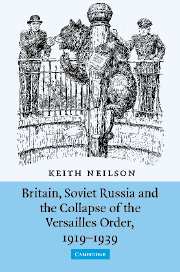Book contents
- Frontmatter
- Contents
- Acknowledgements
- List of abbreviations
- Introduction
- 1 The period of persuasion: British strategic foreign policy and Soviet Russia, 1919–1933
- 2 1933–1934: parallel interests?
- 3 A clash of sensibilities: January to June 1935
- 4 Complications and choices: July 1935–February 1936
- 5 Soviet Russian assertiveness: February 1936–July 1937
- 6 Chamberlain's interlude: May 1937–September 1938
- 7 Chamberlain as Buridan's ass: October 1938–September 1939
- Conclusion
- Appendix I
- Appendix II
- Appendix III
- Bibliography
- Index
- References
Bibliography
Published online by Cambridge University Press: 18 July 2009
- Frontmatter
- Contents
- Acknowledgements
- List of abbreviations
- Introduction
- 1 The period of persuasion: British strategic foreign policy and Soviet Russia, 1919–1933
- 2 1933–1934: parallel interests?
- 3 A clash of sensibilities: January to June 1935
- 4 Complications and choices: July 1935–February 1936
- 5 Soviet Russian assertiveness: February 1936–July 1937
- 6 Chamberlain's interlude: May 1937–September 1938
- 7 Chamberlain as Buridan's ass: October 1938–September 1939
- Conclusion
- Appendix I
- Appendix II
- Appendix III
- Bibliography
- Index
- References
- Type
- Chapter
- Information
- Publisher: Cambridge University PressPrint publication year: 2005



